Why Science Says Clutter Is Bad for Your Health
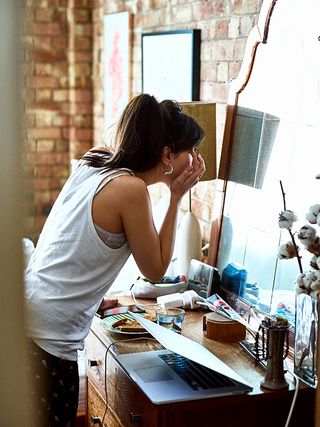
You know that chair in the corner of your bedroom with all the clothes piled on it, the desk with all the leaning towers of paperwork, and the closet that's so filled to the brim that you're afraid to open it for fear of an avalanche? Yeah, they might be affecting your health. It sounds a bit crazy that a pile of inanimate objects can cause your well-being to suffer, but it's true. In fact, there are studies to prove it.
Clutter can cause your stress levels to rise, which in turn can affect your physical and mental health. According to the Mayo Clinic, stress symptoms can affect your body, thoughts, and feelings as well as your behavior. When left untreated, these issues can contribute to health problems like high blood pressure, heart disease, obesity, and diabetes.
A 2010 study from the University of California, Los Angeles, found that women who described their homes as "cluttered" had higher levels of cortisol (the primary stress hormone)—and their depressed mood increased over the course of the day. The people in the study who described their homes as not cluttered saw their cortisol levels and depressed moods drop throughout the day.
Another study in 2016 found that clutter can also disturb your sense of home and your ability to interact with others. When you become too attached to your possessions, the clutter and sheer magnitude of your stuff can be a distraction and overwhelm you. Joseph Ferrari, a professor of psychology at DePaul University and one of the co-authors of the study wrote, "Clutter gets in the way of relationships. Things, not people, become what matters in life, but relationships are what provide us with a sense of community. We identify with our possessions, but when home is plagued by clutter, it gets corrupted in a very harmful way."
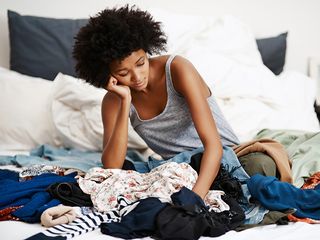
And to make matters worse, out-of-control clutter can also affect your work and your diet. Researchers hypothesized in a 2019 study that people with office clutter can experience increased job strain, depleting their energy and causing them to delay decision-making. Adding to that, a cluttered desk filled with paperwork can make it harder for someone to find important files or to-do lists, which might lead you to drop the ball on some tasks or miss deadlines.
On the healthy eating side, researchers in another study from 2017 found that college students in "less cluttered, less distracting, and less chaotic environments" were more likely to snack less than people in the opposite kind of situation. That makes sense to us because if clutter leads to more stress, stress can lead to overeating.
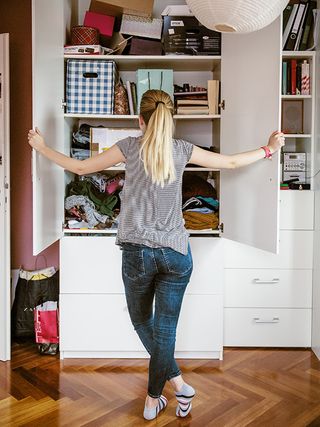
So now you're probably even more stressed about the clutter in your house or office. But the good news is, for the most part, you can fix it. Just keep in mind that in some cases, the decluttering process can't be solved overnight. Some tips we have? Do it in batches, take stock of your stuff, and minimize what you have at home by donating items. Figure out a storage or organizing system that works for you. Enlist friends to help—they'll be honest with you and let you know that you really don't need that dress or bag that you haven't worn in a decade.
And sometimes, buying more stuff can help—organizing stuff, we mean. Interior designer Kristen Pena suggests investing in bins or bowls to capture some of the clutter, especially if you don't consider yourself the tidiest person. "If specific spaces are designated to capture the clutter, it helps to stay organized and to appear tidier," she says. "For example having a drawer for unpaid bills allows you to put them away as they come, but to have organization when you are ready to sit down and pay them."
And when you get things in order, you might find yourself breathing a little easier. Clea Shearer and Joanna Teplin, founders of The Home Edit, said that their clients have told them they've felt less stressed and more settled after getting organization makeovers. They told us via email: "When you are in a space where clutter is minimized and systems prevail, it allows you to feel more grounded, like you can take a breath. There aren't black-hole cabinets or closets tugging at the back of your mind. Everything feels settled. And if that's standing between you and your tranquility, we're always happy to help."
Take a look at some other helpful organization finds below, and good luck!
Storage Bins
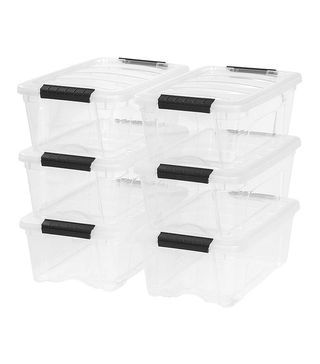
These are great for tucking away seasonal items. Since they're clear you'll be able to find things easily.
Wall Hooks
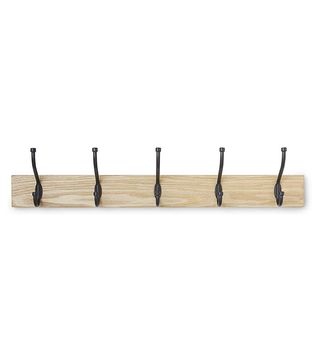
You might not have a ton of square footage, but one of the golden rules when it comes to organizing is to think about the walls. Hang hats, scarves, coats, and more without taking up floor space.
Kitchen Cart
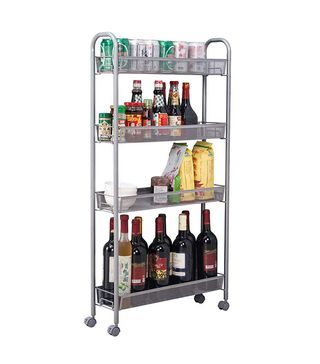
Don't have enough cabinet space so you've used up every inch of your countertops? Get a slim kitchen cart to store ingredients and kitchen tools. You can also do the same in a bathroom, too.
File Organizers
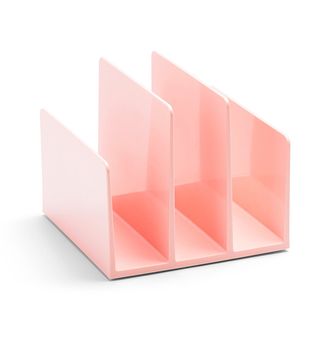
Whether you have a messy desk at the office or at home, you're going to need some organizers to categorize your paperwork.
Shoe Rack
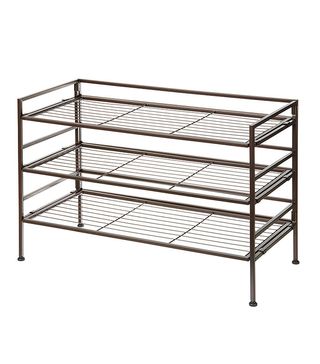
The pile of shoes at the bottom of your closet isn't doing you any favors. Put them on display and keep them in good condition with a shoe rack.
A Guide Book
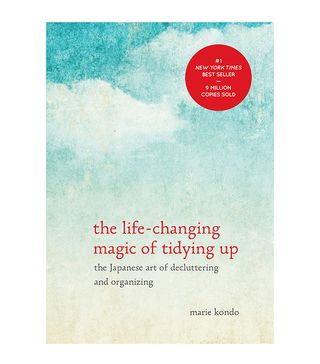
Marie Kondo can't exactly come to your home like on her Netflix show, but you can learn more about her KonMari Method by reading her best-selling book, The Life-Changing Magic of Tidying Up.
Next up: These Indoor Plants Will Make Your Space Healthier—and They're Hard to Kill
Disclaimer
This article is provided for informational purposes only and is not intended to be used in the place of advice of your physician or other medical professionals. You should always consult with your doctor or healthcare provider first with any health-related questions.
Sarah is lifestyle writer and editor with over 10 years of experience covering health and wellness, interior design, food, beauty, and tech. Born and raised in Los Angeles, she attended New York University and lived in New York for 12 years before returning to L.A. in 2019.
In addition to her work on THE/THIRTY and Who What Wear, she held editor roles at Apartment Therapy, Real Simple, House Beautiful, Elle Decor, and The Bump (sister site of The Knot).
She has a passion for health and wellness, but she especially loves writing about mental health. Her self-care routine consists of five things: a good workout, “me” time on the regular, an intriguing book/podcast/playlist to unwind after a long day, naps, and decorating her home.
-
 I Live for Yoga and Pilates—These Are the Pieces That Help My Flow
I Live for Yoga and Pilates—These Are the Pieces That Help My FlowTake notes.
By Humaa Hussain
-
 It's Time to Get Our Nutrition in Check for Summer—This App Is Making It Easy
It's Time to Get Our Nutrition in Check for Summer—This App Is Making It EasyThe recipe ideas are endless.
By Who What Wear
-
 This Founder Shares Why We Should Start Celebrating Rest
This Founder Shares Why We Should Start Celebrating RestBurnout is nothing to be proud of.
By Kia Topps
-
 If You're Battling With Digestive Issues, This Could Be Why
If You're Battling With Digestive Issues, This Could Be WhyTurns out, you may not have IBS after all.
By Kia Topps
-
 Our Editors Own a Lot of Sneakers, But This Pair Comes in First Place Every Time
Our Editors Own a Lot of Sneakers, But This Pair Comes in First Place Every TimeA major win.
By Aniyah Morinia
-
 Why Dr. Deepika Chopra Believes that Optimism is Resiliency
Why Dr. Deepika Chopra Believes that Optimism is ResiliencyWhy you should start embracing every feeling.
By Kia Topps
-
 How TikTok's Favorite Photographer Helped Me Find My Confidence
How TikTok's Favorite Photographer Helped Me Find My ConfidenceI renewed my relationship with myself.
By MacKenzie Green
-
 I Changed My Mind About Strength Training When I Tried This Workout
I Changed My Mind About Strength Training When I Tried This WorkoutMy confidence is officially on 10.
By Kia Topps

